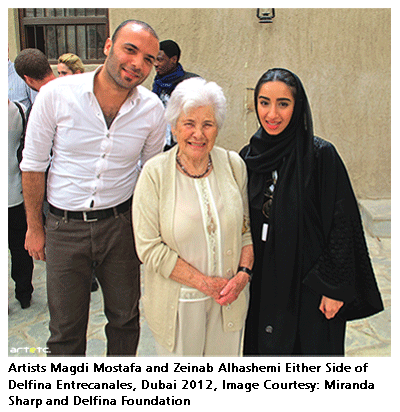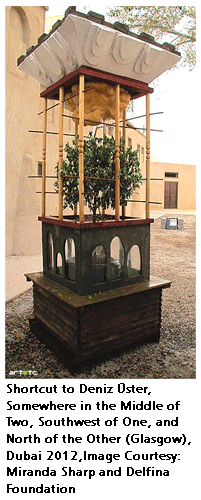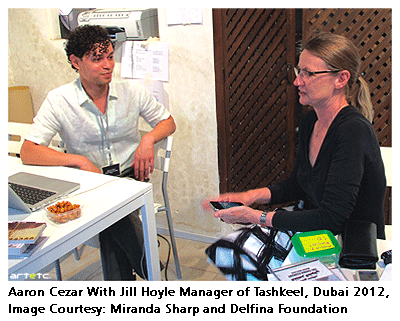- Editorial
- Shibu Natesan Speaks on Protest Art
- Rising Against Rambo: Political Posters Against US Aggression
- Transient Imageries and Protests (?)
- The Inner Voice
- Bhopal – A Third World Narrative of Pain and Protest
- Buddha to Brecht: The Unceasing Idiom of Protest
- In-between Protest and Art
- Humour at a Price: Cartoons of Politics and the Politics of Cartoons
- Fernando Botero's Grievous Depictions of Adversity at the Abu Ghraib
- Up Against the Wall
- Rage Against the Machine: Moments of Resistance in Contemporary Art
- Raoul Hausmann: The Dadaist Who Redefined the Idea of Protests
- When Saying is Protesting -
- Graffiti Art: The Emergence of Daku on Indian Streets
- State Britain: Mark Wallinger
- Bijon Chowdhury: Painting as Social Protest and Initiating an Identity
- A Black Friday and the Spirit of Sharmila: Protest Art of North East India
- Ratan Parimoo: Paintings from the 1950s
- Mahendra Pandya's Show 'Kshudhit Pashan'
- Stunning Detours of Foam and Latex Lynda Benglis at Thomas Dane Gallery, London
- An Inspired Melange
- Soaked in Tranquility
- National Museum of Art, Osaka A Subterranean Design
- Cartier: "Les Must de Cartier"
- Delfina Entrecanales – 25 Years to Build a Legend
- Engaging Caricatures and Satires at the Metropolitan Museum
- The Mesmerizing World of Japanese Storytelling
- The Metropolitan Museum of Art Exhibiting Lyrical Visions: Paintings from North India
- Random Strokes
- Asia Week at New York
- Virtue of the Virtual
- What Happened and What's Forthcoming
- Art Events Kolkata, March – April 2012
- Mumbai Art Sighting
- Art Bengaluru
- Delhi Dias
- Preview, April, 2012 – May, 2012
- In the News, April 2012
- Cover
ART news & views
Delfina Entrecanales – 25 Years to Build a Legend
Issue No: 28 Month: 5 Year: 2012
by Franck Barthelemy
 There are not many people like Delfina Entrecanales in the art world. Rich, discreet, energetic, publicity shy and at 85 years old Delfina can proudly say she is the grandmother of many an artists. Her legend started in 1988 when she opened a few artists' studios in London. Not to rent them but to offer them. The mother of three grown up children was looking for some activity to keep her busy. Art became an option. When she looked at the art scene, she quickly realized that artists struggled to get a place to work. The real estate market kicked them off the spaces available in the city and sent them to gloomy suburbs. Besides the location, renting a studio became a huge effort for most of the artists who had to have a day job to pay for their studios. As an amazing philanthropist, Delfina invited artists to work from her studios, free of charge. She also used to give them lunch for £1 because she believed an artist should be able to focus on his/her practice without starving. Probably a genetic feature of all Spanish mothers and grandmothers. And she expected nothing in return. Absolutely nothing, not even a piece of work for her collection. Her motivation: exchanging ideas, facilitating artists' researches, giving artists the exposure they deserve.
There are not many people like Delfina Entrecanales in the art world. Rich, discreet, energetic, publicity shy and at 85 years old Delfina can proudly say she is the grandmother of many an artists. Her legend started in 1988 when she opened a few artists' studios in London. Not to rent them but to offer them. The mother of three grown up children was looking for some activity to keep her busy. Art became an option. When she looked at the art scene, she quickly realized that artists struggled to get a place to work. The real estate market kicked them off the spaces available in the city and sent them to gloomy suburbs. Besides the location, renting a studio became a huge effort for most of the artists who had to have a day job to pay for their studios. As an amazing philanthropist, Delfina invited artists to work from her studios, free of charge. She also used to give them lunch for £1 because she believed an artist should be able to focus on his/her practice without starving. Probably a genetic feature of all Spanish mothers and grandmothers. And she expected nothing in return. Absolutely nothing, not even a piece of work for her collection. Her motivation: exchanging ideas, facilitating artists' researches, giving artists the exposure they deserve.
No need to say that the venture was successful. 25 years later, I met Delfina at one of the Delfina Foundation's programme in Dubai at the occasion of the Art Dubai Projects' initiative. She immediately told me, “you meet the artists, not me.” So I met the six artists in residence and visited their studios. All their works provided a reflection on Middle East, an under-represented region on the art scene that the Foundation show cases for many years now. From the UAE, Turkey, Algeria or Egypt, they used different media to carry out their projects. They talked about tradition and wind towers, they talked about censorship, they talked about sounds captured in the streets, they talked about the old souk, they talked about environment. All artists, whether local or international, had a critical view of the city of Dubai and offered it to the viewers very personally, with more or less emotions.

I spent some time with Alexandra MacGilp, the curator in residence, whose role was to provide critical and artistic support to the artists. Alexandra is from the UK. She is a PhD, a curator and a writer and has worked in London, Amsterdam, Hamburg and Kabul. During the three month residency, she was also the one, by default, looking after the logistic, she said laughing loudly, trying to resolve over the phone an issue with the electricity company. Meeting the artists, understanding their practises and encouraging exchanges between them would probably be her main take away. Making new friends too. During her three months in Dubai, Alexandra had a look at the art scene. First and foremost, she realized Dubai is not an easy city if you are not a local. The distances don't help creating meeting points or forums for the artists and she believes it is a big drawback. She was stunned to observe there is no art course there. Hence most of the local artists come from a design background. She was thrilled to meet ambitious talents who have so much to say! Alexandra also made an interesting gender comment: there are only women in the art business in Dubai. Is it a good sign? In three months, the curator that she is, found great potential to organize a show. She is already on the job. And this typical of a Delfina Foundation's residency: it brings people together, it opens doors to opportunities, it broadens the agora to encourage debates.
 Aaron Cesar, the Foundation's director, and Kristine Khouri, a researcher and alumni of the Foundation, took over from Alexandra who had to rush to solve other logistical issues. Both insisted on the Foundation being open to all artists and art practitioners. Though there is a clear focus on showcasing Middle Eastern artists, the Foundation is more and more driven by themes and tries to connect socially engaged art practises between artists from the Middle East and other regions. Financially independent and not relying on any donors or grants, the Foundation is a free electron on the art scene. They can hence partner and co-operate with whoever can bring value to their artists in residence, up to 4 participants at a time in London, soon up to 8, in two different houses. The Foundation will do anything to connect their artists in residence with institutions and people that could be useful for their projects. The 3-permanent-member team is resourceful and the Delfina brand opens many doors. If need be, Delfina's intervention will help closing loose ends. Over the last 25 years, Delfina helped discreetly and efficiently probably over 400 artists, including Turner Prize nominees. And she wants to do more.
Aaron Cesar, the Foundation's director, and Kristine Khouri, a researcher and alumni of the Foundation, took over from Alexandra who had to rush to solve other logistical issues. Both insisted on the Foundation being open to all artists and art practitioners. Though there is a clear focus on showcasing Middle Eastern artists, the Foundation is more and more driven by themes and tries to connect socially engaged art practises between artists from the Middle East and other regions. Financially independent and not relying on any donors or grants, the Foundation is a free electron on the art scene. They can hence partner and co-operate with whoever can bring value to their artists in residence, up to 4 participants at a time in London, soon up to 8, in two different houses. The Foundation will do anything to connect their artists in residence with institutions and people that could be useful for their projects. The 3-permanent-member team is resourceful and the Delfina brand opens many doors. If need be, Delfina's intervention will help closing loose ends. Over the last 25 years, Delfina helped discreetly and efficiently probably over 400 artists, including Turner Prize nominees. And she wants to do more.
Delfina recently engaged in a new mission: to convince old ladies like her that they can do better activities with their money than collecting hand bags and diamonds. She organizes lunches and dinners to talk about her experience and how enriching her art journey is. She explains how the model works and what costs are involved. She talks about the absolute necessity to connect cultures, especially in regions where immense parts of the population are young! Let's hope that Delfina's example and motivational energy will help convincing ladies in India. There are so many young talents who graduate from art schools every year and instead of starting an exciting and challenging art career will go back to their family businesses growing apples or selling cell phones! Who is going to be the first one in India to invite Delfina to talk about her Foundation? Who is going to be the first one to set up a foundation based on the Delfina's model? The challenge is set!